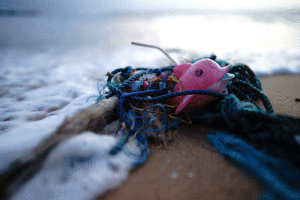
A small sample of plastic debris that washes ashore
July is rife with reasons and opportunities to celebrate. The combination of warm weather, summer vacations and major holidays predictably leads to weekend barbecues, cookouts and parties. But when it comes time to decide who’s bringing the burgers, chips and deserts, consider calling dibs on the plates and cutlery—it might be the perfect way to participate in Plastic-Free July.
Plastic-Free July is a challenge started by the Plastic Free Foundation with the goal of reducing the use of single-use plastics like straws, jugs, and food wrappers. Discarded plastics like these account for some of the most abundant trash in the oceans. Because single-use plastics are designed to be discarded, they often wind up in the trash rather than being repurposed or recycled.
Discarded plastics end up in the ocean at an alarming rate—roughly 11 million tons of plastic enter the oceans each year. Hundreds of millions of tons of disposed plastics are already circulating within the world’s marine environments.
Removing plastics from the ocean is a costly and difficult task. Some estimates from a study commissioned by the World Wildlife Fund put the cost of cleaning up trash from the oceans at up to $15 billion per year. That estimate does not account for the cost of proper disposal and
processing of waste to limit the amount of trash entering the ocean. This trash is harmful to marine organsims and the health of the ecosystems that support them.
Unfortunately, the impacts of plastics in the ocean are not limited to the visible pieces of garbage caught in ocean currents. Microplastics, or plastics particles less than 5 millimeters in length, are tiny but harmful consequences of plastic pollution. Microplastics are usually either the result of industrial processes or from the breakdown of larger plastic objects. In the United States, microplastics called microbeads were once commonly used in health and beauty products as exfoliants—however, these were banned in 2015. Microplastics are the subject of much ongoing research, and the extent of their impacts on both human, plant, and animal life remains unknown.
The global Plastic Free July movement helps people learn about and become a part of solutions for plastic pollution. Throughout the month of July, Texas Sea Grant and other programs will provide resources and ideas for reducing individual single-use plastic waste at home, school, and work and beyond.
Be sure to tune in to Texas Sea Grant’s Facebook, Instagram, and YouTube channels to see plastic free content all through July and beyond! You can also find tips at plasticfreejuly.org.
Other Resources:
A Guide to Plastic in the Ocean
Plastic pollution in the ocean: data, facts, consequences
Texas Shorelines is a service of the Texas Sea Grant College Program at Texas A&M University. Texas Sea Grant is a unique partnership that unites the resources of the federal government, the State of Texas and universities across the state to create knowledge, tools, products and services that benefit the economy, the environment and the citizens of Texas. It is administered through the National Oceanic and Atmospheric Administration and is one of 34 university-based Sea Grant Programs around the country.
Texas Sea Grant is a non-academic research center at Texas A&M University. The program’s mission is to improve the understanding, wise use and stewardship of Texas coastal and marine resources.
